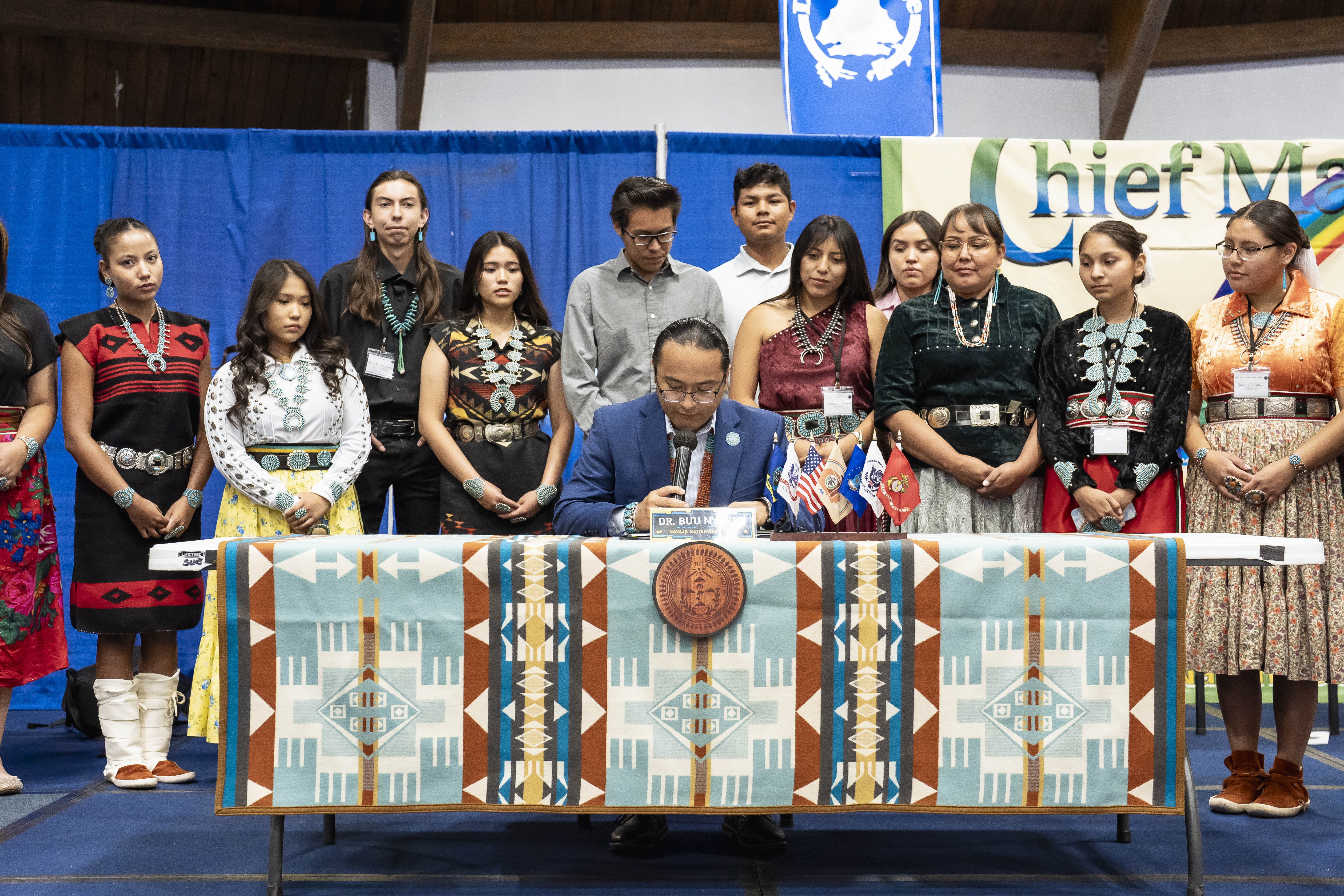
- Details
- By Navajo Nation Media
TSAILE, Ariz. – Navajo Nation President Buu Nygren told 119 new 2024 Chief Manuelito Scholarship recipients that earning that honor is more than financial support for the next four years.
“It recognizes your hard work, dedication and commitment to academic excellence,” he told Friday at Diné College. “Congratulations to all 119 of you!”
The President took the opportunity to sign legislation to allocate $2.2 million for summer youth employment at local chapters or within the tribal government this winter and next summer.
The Navajo Nation Council approved the funding during its summer session from July 15-19.
“This initiative is crucial to develop practical skills, gain work experience and ensure that our brightest minds contribute to our community's growth and development,” President Nygren said.
Amya Hillis is one of 119 Diné high school graduates to be awarded the prestigious 2024 Chief Manuelito Scholarship.
Hillis is among several students who are college-bound this fall.
Also honoring them was Navajo Nation Council Speaker Crystalyne Curley and the Office of Navajo Nation Scholarship and Financial Assistance.
Hillis will attend Columbia University in New York. She said the cumulative hard work she put in as an alumna of Farmington High School helped her earn her Chief Manuelito scholarship.
“It is an honor and a privilege to even have this significant scholarship,” said Hillis, who is Kinyaa’aanii, Towering House People, and born to Na’ahiłii, African American People. “It is a definite testament to hard work.”
She said she will use the $7,000 per academic year to study financial economics at the Ivy League school. Her goal is to end economic inequities in the Navajo Nation. Having a curious mind is vital to finding solutions, she said.
To earn the scholarship, each recipient took Navajo history and language courses, held a high-grade point average and a minimum composite score on the ACT or SAT, according to the Office of Navajo Nation Scholarship and Financial Assistance.
Since its inception in 1980, hundreds of scholars like Hillis have carried forward Manuelito’s vision to become beacons of knowledge and progress.
Headman Manuelito is renowned for his encouragement of his Diné to learn the white man’s ways through education.
“My grandchildren, education is a ladder,” he is known to have said. “Tell our people to take it."
At the awards ceremony, President Nygren told of own his academic journey after high school. He earned his BS in construction management and technology from Arizona State University, an MBA from ASU and his Ed.D. in organizational change and leadership from the University of Southern California.
He said the celebrated words of Chief Manuelito resonate deeply with him as leader, father and academic scholar.
The education goal of his administration is to end “brain drain” from the Navajo Nation, he said. He defined brain drain as seeing talented and educated young Navajos leave the Navajo Nation for urban areas to seek better opportunities.
It is his goal, and the goal of my administration, to retain this talent within Navajo communities, he said.
“We need your vision, leadership and skills to help our Navajo Nation thrive,” he said. “Your contributions are essential to address the challenges we face and to build a brighter future for all Navajo people.”
He challenged each of the Chief Manuelito scholars to give back to the Nation through their chosen field of study.
Kavian G. Zohnnie, originally of Low Mountain, Ariz., said he knows how prestigious being awarded this scholarship is. Holding his wooden plaque that names him a Chief Manuelito scholar, Zohnnie sighed a breath of relief.
“Going to a big university like the University of Arizona is a big commitment,” Zohnnie said. “This is very helpful in every aspect.”
He plans to study architectural engineering and is one of 10 Chief Manuelito scholars who will attend UA.
One inspiration comes from seeing the demand of basic building infrastructure, he said. This summer, he is helping his grandpa build a home, a timely project for his academic studies.
Help us defend tribal sovereignty.
At Native News Online, our mission is rooted in telling the stories that strengthen sovereignty and uplift Indigenous voices — not just at year’s end, but every single day.
Because of your generosity last year, we were able to keep our reporters on the ground in tribal communities, at national gatherings and in the halls of Congress — covering the issues that matter most to Indian Country: sovereignty, culture, education, health and economic opportunity.
That support sustained us through a tough year in 2025. Now, as we look to the year ahead, we need your help right now to ensure warrior journalism remains strong — reporting that defends tribal sovereignty, amplifies Native truth, and holds power accountable.
 The stakes couldn't be higher. Your support keeps Native voices heard, Native stories told and Native sovereignty defended.
The stakes couldn't be higher. Your support keeps Native voices heard, Native stories told and Native sovereignty defended.
Stand with Warrior Journalism today.
Levi Rickert (Potawatomi), Editor & Publisher

